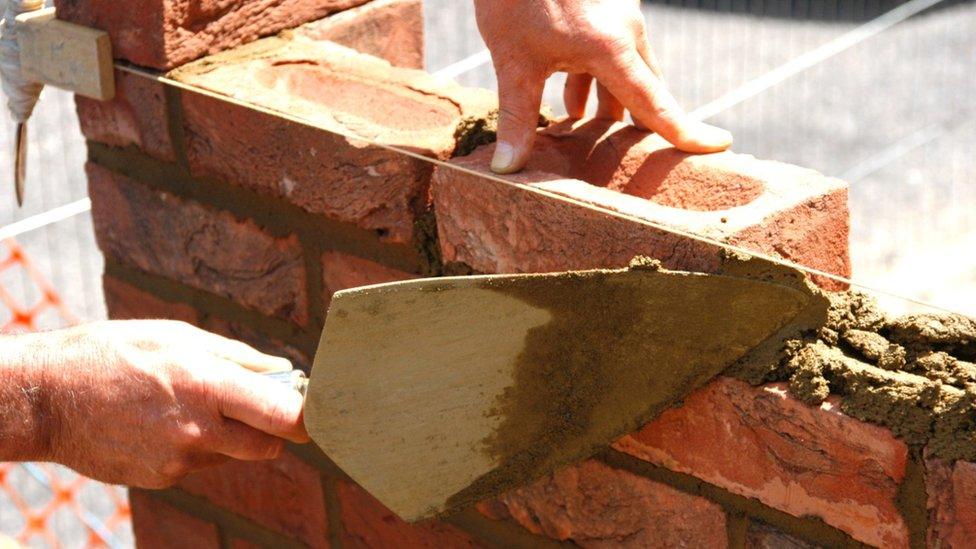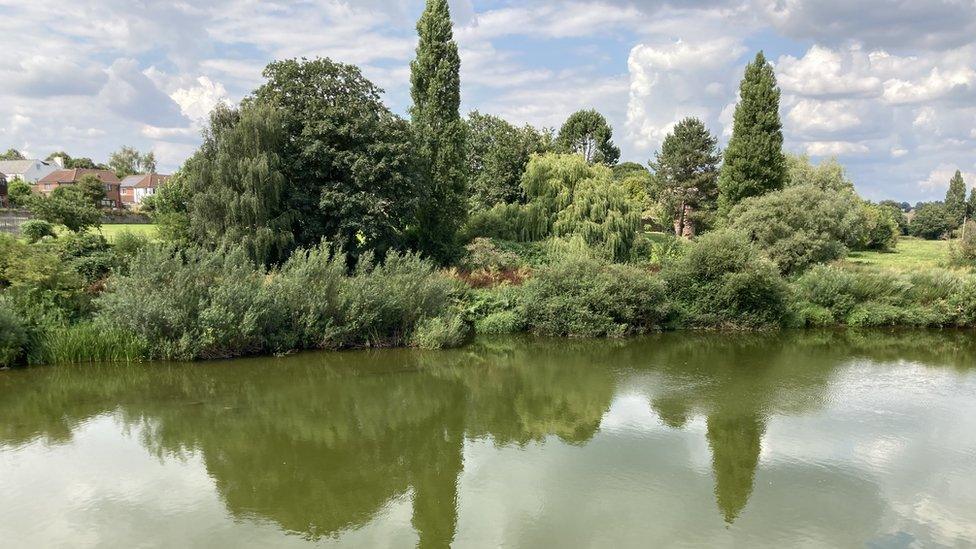Torquay developer frustrated by anti-pollution rules
- Published

Developers say the need for nutrient neutrality are holding back house building projects
A Devon-based developer is frustrated by EU-era river pollution rules it says are hindering the ability to build houses.
The government said it was "considering next steps" after plans to scrap so-called "nutrient neutrality" restrictions were defeated last month.
The West Country Rivers Trust said relaxing the rules risked undermining work to improve the health of rivers.
Torquay-based Cavanna Homes said it was "desperate for a solution".
The company said it had about 340 proposed homes being held up because of the regulations.
Managing director Grayham Tucker said the company had paid £6m for a site at Crossways in Dorset, which would have employed 434 people to deliver 140 units, including 49 affordable homes.
He said: "We had planning permission three years ago and we've still not been able to build the homes.
"We should be handing keys over today."

Grayham Tucker said the rules were holding up building projects
Mr Tucker said the company had been told to spend £1.2m on nutrient mitigation credits to fund schemes offsetting any nutrient pollution produced by household waste water.
He said none of the credits were currently available to buy in Dorset, meaning the Crossways development could not go ahead.
Natural England said the government was investing £30m to ensure "sufficient supply of mitigation credits [are] available in every area that needs them".
Mr Tucker said the situation was having a "substantial" financial impact on the wider housebuilding industry, putting homes and livelihoods "at risk".

What is nutrient neutrality?
A project is "nutrient neutral", external if it can prove it will not add extra nutrients to the surrounding water.
While nutrients may sound healthy, flooding an area with substances such as phosphates and nitrates can reduce the quality of water, harm wildlife and cause excess algae growth.
The nutrient neutral rules have been in place since 2019, following a ruling by the European Court of Justice.
In protected areas across England, developers must prove they will not cause any nutrients to seep into nearby water for new building projects to be granted nutrient neutral status before they can begin building - rather than allowing builders to mitigate the impact of their work across multiple developments.
Research by the Environmental Audit Committee in Parliament, external found agricultural pollution was "the most common factor" for ecological damage in the UK's rivers and other water bodies.
But housing developments can also pose a risk due to the waste water and sewage that can come from new homes, as well as run-off from construction sites.

The government has declined to comment on whether the King's Speech would include any new legislation to ease the rules.
Ministers have argued the regulations were "defective" and were holding up plans for up to 100,000 new homes that would only have a "very small" impact on nutrient pollution.
Tony Fuller, from Winsham, near Chard in Somerset, said he was told to spend £55,000 on "credits" when applying to build an energy-efficient property at the bottom of his garden.
Planners told him this was to offset any pressure his home would add to the local sewage treatment works over the next century.
Mr Fuller said Somerset Council wanted him to spend £26,000 upfront and the rest after he had moved in to the property, which he felt was "ridiculous".
"It was a huge amount of money and you're already spending £4,500 on other surveys," the retired teacher said.
"It's a Catch 22: I can't get planning permission until I get phosphate credits, but I can't get phosphate credits because they are not available. Therefore I'm stuck in this limbo land".
Somerset Council said it could not comment on individual applications, but it was "working to identify solutions and minimise delay and uncertainty around planning applications since Natural England raised the issue of nutrient neutrality which affects 74 local authorities across the country".
The West Country Rivers Trust said any move away from the "polluter pays principle" would be a "backwards step" as it tried to curb nutrient pollution within protected rivers such as the Axe in Devon and Dorset, and the Camel in Cornwall.
Trust CEO Dr Laurence Couldrick said the conservation charity was beginning to find "routes" and "opportunities" for less costly offsetting opportunities.
He said: "While I am keen that we keep the need for [nutrient neutrality] in place, I think there has to be some common sense in how it's delivered".
Luke Pollard, Labour MP for Plymouth Sutton and Devonport, said that his party had offered the government support to reform the rules, but in a way that would not "trash" protected waterways.
He said: "We shouldn't be choosing between building homes and protecting the environment. We've got to do both together."
A spokesperson for the National Farmers' Union said: "As farmers continue to take voluntary action through industry-led initiatives to improve the water environment, the NFU is seeking to work closely with local authorities, Defra and the Environment Agency to drive further improvements that benefit our soils, plant health and water quality."
A South West Water spokesperson said: "We are progressing with schemes in the River Axe catchment to reduce phosphates entering the river from our own operations, and to play our part in helping to improve river water quality."

Follow BBC News South West on Twitter, external, Facebook, external and Instagram, external. Send your story ideas to spotlight@bbc.co.uk.
Related topics
- Published14 September 2023

- Published29 August 2023
